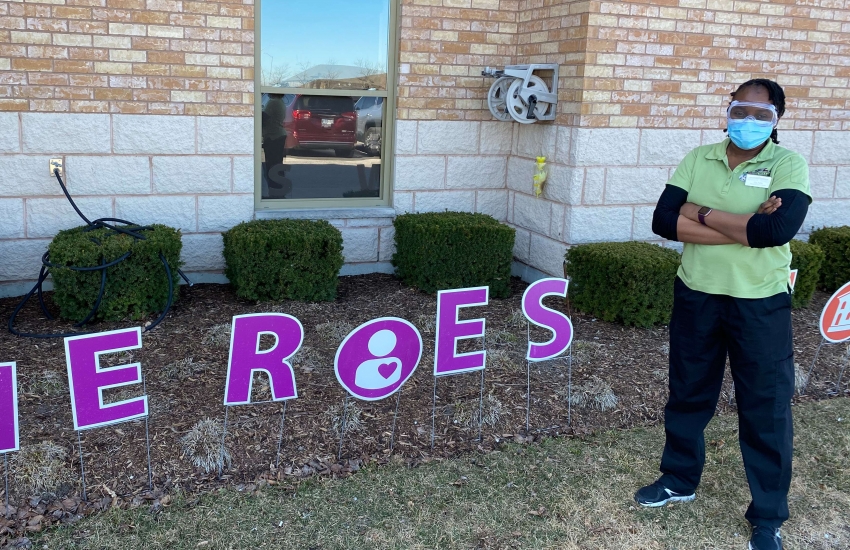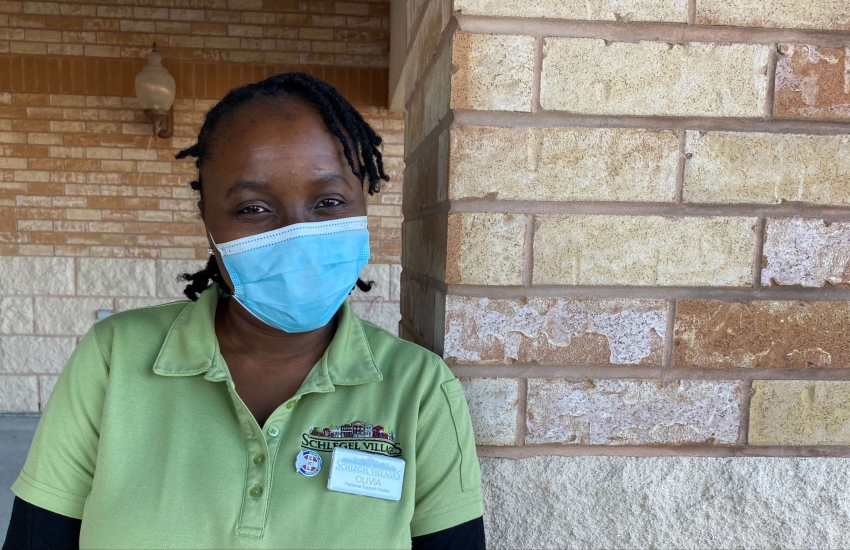
Olivia Okongwu's four-year-old son calls what she does "hero's work."
"Heroes work here," say signs at the entrance to the Village of Aspen Lake, the long-term care home in East Windsor where his mother currently works weekends.
Okongwu, who is a month away from completing St. Clair College's Personal Support Worker program, laughs when she explains this is how her youngest boy has come to understand her job.
Heroics has nothing to do with why she chose to start working at Aspen Lake during a COVID-19 outbreak, she said.
She first walked through the doors in October for a clinical placement shadowing personal support workers as they helped residents with daily tasks like eating, bathing and moving around. She immediately felt she belonged and in tune with the way the staff put residents' needs first, she said.
She was encouraged to apply for a job as a care aide, doing the same tasks as personal support workers but with more supervision.
When she started on Dec. 22, Aspen Lake was struggling with a COVID-19 outbreak.
Infected staff members couldn't work and, due to personal circumstances, others weren't able to work extra hours, said Kimberly Arquette, senior director of care for Schlegel Villages in London and Windsor, including Aspen Lake.
"I did have other students that were wonderful and able to work for us, as well, but they were very specific in not wanting to be in the tower that had COVID," Arquette said. "Olivia said, 'No, I want to work in that tower. I want to work with those residents that are needing the most care.'"
Okongwu helped a team of seasoned staff members look after the residents "and she just jumped in and did whatever was needed. She did that for many weeks while we were in an outbreak at a most challenging time," Arquette said.
Okongwu said she was scared, "but I told myself, 'You've been taught at St. Clair (personal protective equipment) – the right PPE and everything is going to be fine.'"
She worked through the Christmas holidays, including Christmas Day. She told her boys, ages four and seven, that not going to work would be abandoning the residents. What if that happened to their grandparents in Nigeria? she asked them. They understood.
"If I didn't, I felt like I'd be leaving them hanging," Okongwu said of caring for residents with COVID. "At that moment, it wasn't about me. I had decided to be a caregiver... It's a call to duty. That's what it was for me."
She saw weak, ill residents taken to hospital and never return. "It hurt. It felt like someone pierces your heart and twists," she said.
When the outbreak ended in early February, Okongwu said she was grateful to continue doing work that is meaningful and makes her feel valued. She plans to continue working at Aspen Lake as a personal support worker after she graduates in April.
It is another step in a new life. Okongwu came to Canada from Nigeria and arrived in Windsor in February 2020 with her husband and their two boys. A month later, the COVID-19 pandemic hit the region.
Okongwu, who trained in human resource management and worked for an insurance company in Nigeria, wanted a different career. "I wanted to help," she said.
Long-term care homes have been at the epicentre of the pandemic, which has increased the demand for workers like Okongwu, said Linda Watson, chair of St. Clair's School of Nursing.
At the same time, outbreaks made it difficult for the College's personal support worker students to find unpaid clinical placements in the summer and fall of 2020. As a result, many worked as care aides to complete their placement hours before graduating, Watson said.
In February, the Ontario government announced it will spend $115 million to train up to 8,200 personal support workers, covering their tuition and paying them during their clinical placements. St. Clair and other colleges will train the workers in six months, rather than the typical eight, starting with the first intake of students in April. Some students who started training earlier will be paid while doing their clinical placements.
Okongwu and her classmates, who started the program in September, are not covered by the provincial funding, but St. Clair is reimbursing their tuition.
Their decision to become personal support workers "should be recognized and rewarded as well," President Patti France said in a letter to students.
